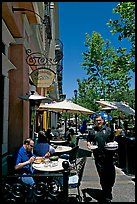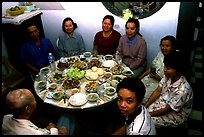|
Obesity & Weight Loss - What you eat and How you eat
You are what you eat and how you eat.
Eating slower can aid weight loss
It makes sense to think that if you want to lose weight you need to eat less. For many, this will mean cutting out some ‘favourite’ foods and perhaps eliminating anything other than three ‘healthy’ meals a day.
Not eating between meals can definitely cut your calorie intake and help with shedding some pounds. However, there are several reasons why this may not be effective in the long run.
One reason is the effect eating less can have on your appetite. Going without food for long periods at a time can induce hunger, which in turn makes you eat more at meal times - especially in the evening. Over-eating in the evening may relate to the body’s attempt to make up for food it feels it missed out on earlier.
Some research now also suggests that the reason hunger leads to over-eating relates to the speed with which we eat.
In a 2007 US study from the University of Rhode Island in Kingston, 30 women were asked to eat a pasta-based meal under two distinct conditions: At one sitting, they were asked to take small bites and chew each one 15-20 times. At another sitting, they were asked to eat as quickly as possible. The women ate until they were satisfied.
Compared to the ‘speed-eaters’, the ‘slow-eaters’ consumed about 70 calories less and they also felt more satisfied immediately after their meal and an hour later. This suggests that ‘going hungry’ and the ‘speed-eating’ that follows can easily allow you to eat much more than is necessary.
Another reason for not getting too hungry before meals is that it makes it difficult to keep a rein on not just how much is eaten, but what is eaten too. When we get hungry, it becomes a lot harder to resist ‘junk’ or less healthy food and we usually go for foods such as bread, pasta and rice – which satisfies quickly but does very little for losing weight.
So, to keep it simple: If you are dieting, don’t do it by going hungry and remember that the digestive process starts in the mouth. So, chewing your food slowly and properly will aid the digestive system and have a positive effect on losing weight.
On the back of the previous study, a recently published study, in the American Journal of Clinical Nutrition, took 22 individuals and measured their intake of a test food (semi-solid chocolate custard) under a number of different circumstances:
In one test, individuals were instructed to consume the custard using relatively small bites (5 grams of custard per mouthful). At another time, they were instructed to take larger bites (15 grams). In both of these settings, test subjects were also asked to process the food in their mouths quickly (3 seconds before swallowing) and slowly (9 seconds). In all test settings, individuals were instructed to eat as much as they wanted and to stop when pleasantly satisfied.
One notable finding from this study was that less was eaten when the subjects took small bites compared to large bits. Average intake was about 100 calories less – that is a calorie reduction of about 23 per cent.
Another notable observation was that the longer the oral processing time, less was eaten too. Longer processing time was associated with a reduced calorie intake: 70 calories for small bite sizes and 50 calories for larger bite sizes.
This study suggests that taking small bites and chewing them thoroughly (to increase oral processing time) may lead to a natural reduction in the amount of food consumed during a meal. It would be nice to see this study repeated with, not chocolate custard, but real food (e.g. meat and vegetables) to see how applicable these study results might be to the real world...
Other dieting suggestions
It may sound as if the research really is stating the obvious. But how many of us really sit down and enjoy our meals slowly – taking time to taste what we eat and properly chew what we put in our mouths. The last twenty four hours alone, I stood up eating at least two of my meals, not giving a moment of thought of what I was gulping down...
When you go on a diet or simply attempt to eat better and healthier, keep the following in mind too:
Concentrate on the quality of food you eat basing your diet on natural and unprocessed foods as much as possible. Meat, fish, fruit vegetables and nuts are all good candidates here. Many people find such a diet is naturally satisfying, but should hunger strike, do not resist any temptation to eat a healthy snack (e.g. fruit, nuts) between meals. By doing so, you may well keep yourself out of trouble later on.
The idea of dieting is to come to main meals ready for food, but not so hungry that ‘speed-eating is inevitable’. By putting a brake on our appetite, healthy snacking between meals can actually help to ensure that meals are eaten slowly, chewed thoroughly and properly savoured. This, in turn, may actually help to moderate food intake in the long term.
There is evidence that links regular eating with a reduced risk of obesity. In one study, individuals eating 5 or more times a day, compared to those eating 3 or less times each day, were half as likely to be overweight
Related articles
Green Vegetables and fruits for weight loss and reducing obesity
source: www.thehealthierlife.co.uk
|






 How we eat influences how much we eat
How we eat influences how much we eat  However, there is other evidence which supports the fact that what happens in the mouth can have a bearing on meal- satisfaction and quantities eaten. Research has found that eaten (chewed) food is more satisfying than food just infused (swallowed i.e. smoothies) into the gut. Taking time to savour food properly might turn out to be quite powerful weapon in our efforts to prevent the overconsumption of food.
However, there is other evidence which supports the fact that what happens in the mouth can have a bearing on meal- satisfaction and quantities eaten. Research has found that eaten (chewed) food is more satisfying than food just infused (swallowed i.e. smoothies) into the gut. Taking time to savour food properly might turn out to be quite powerful weapon in our efforts to prevent the overconsumption of food. 